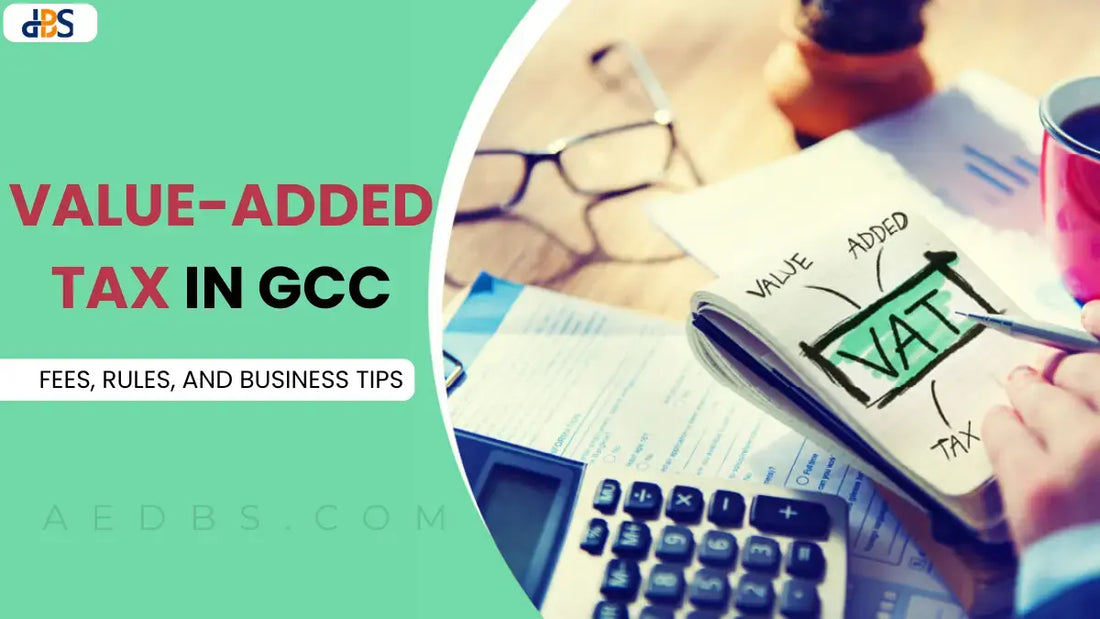Value-Added Tax in GCC: Fees, Rules, and Business Tips (2025)

The introduction of VAT in the GCC countries has changed how businesses work in this field. Countries like UAE, Saudi Arabia, Bahrain and Oman now depend on VAT to generate government income, making compliance with all sizes. Every company, large or small, complies with VAT regulations and reports sales correctly to avoid fines or problems during audits.
VAT affects not only businesses but also to customers, as it is included in the prices of goods and services. Companies need to train staff, update accounting systems, and claim the right VAT tracking to claim refund and maintain accurate records.
The GCC, which includes Saudi Arabia, the UAE, Bahrain, Kuwait, Oman and Qatar, introduced this common VAT system to reduce dependence on oil revenues and modernize taxation across the region.
In short, GCC VAT is more than a tax - it is a step towards economic stability and structural growth, which needs to be effectively adapted to businesses.
What Is GCC VAT?
-
GCC VAT is a tax applied to goods and services.
-
Businesses must register once their turnover exceeds a certain threshold.
-
Most countries set it at 5%, while Saudi Arabia applies 15%.
-
VAT allows governments to fund roads, schools and public services.
-
GCC VAT accounting records the VAT collected and paid.
-
Accurate accounting prevents errors and supports easy audits.
Role of VAT in the GCC
The GCC countries introduced VAT on January 1, 2018, marking a transition from almost a tax-free environment to a structure that allows governments to generate revenue beyond oil. Each GCC country has gradually implemented the VAT, customizing it in accordance with their specific economic and regulatory needs. This combined effort tries to establish a unified tax system that accelerates growth in GCC, guarantees financial stability and supports structural development.
Country-Specific VAT Rules
UAE VAT Rules
The UAE introduced VAT on January 1, 2018, under the supervision of the Federal Tax Authority (FTA), which monitors its application and compliance.
Key Highlights:
-
Standard Rate: 5%
-
Mandatory Registration Threshold: AED 375,000
-
Exemptions: Certain sectors such as healthcare and education are exempt from VAT.
Saudi Arabia VAT Rules
Saudi Arabia implemented VAT on January 1, 2018. A major change was made to the kingdom’s tax system in July 2020, when the rate was increased.
Key Features:
-
Standard Rate: Initially 5%, later increased to 15% in July 2020.
-
Mandatory Registration Threshold: SAR 375,000
-
E-Invoicing: Introduced to ensure greater compliance and transparency.
Bahrain VAT Rules
Bahrain implemented its VAT structure on January 1, 2019, with gradual adjustments over time.
Key points:
-
Standard rate: Started at 5%, later increased to 10% in January 2022.
-
Mandatory registration threshold: 37,500 BHD
-
Exemptions: Applicable to essential products and services to reduce the burden on consumers.
Kuwait VAT Rules
Kuwait has postponed VAT implementation several times, and the structure is still under review.
Expected details:
-
Standard rate: Likely to follow the GCC's standard 5% rate.
-
Registration requirements: Yet to be officially determined.
Oman VAT Rules
Oman launched its VAT system on April 16, 2021, which is closely aligned with the GCC model.
Key details:
-
Standard rate: 5%
-
Mandatory registration threshold: OMR 38,500
-
Zero-rated and exempt supplies: Similar provisions to other GCC countries, especially for essential sectors.
Qatar VAT rules
Qatar has delayed the introduction of VAT several times. However, its structure is expected to be in line with other GCC countries.
Expected aspects:
-
Standard rate: Expected to be 5% in line with the GCC agreement.
-
Thresholds and procedures: Not yet finalized.
You may also like: How to Get Tax Identification Number (TIN) in Dubai, UAE (A Guide)
VAT Compliance Requirements
VAT compliance begins with registration, which is mandatory when a professional taxable turnover crosses a certain threshold in each GCC country.
Mandatory registration: Required when a turnover is higher than a certain threshold (e.g., AED 375,000 in the UAE).
Voluntary registration: Optional for businesses above the lower threshold (e.g., AED 187,500 in the UAE).
Deregistration: Applicable when business activity ceases or turnover falls below the threshold.
VAT Returns And Payment Deadlines
Businesses must submit regular VAT returns, reporting their taxable sales and purchases.
-
Filing frequency: Usually quarterly or annually, depending on national laws.
-
Payment deadlines: Must pay within a certain timeframe due to VAT. For example, in the UAE, the payment must be made within 28 days of the end of the tax period.
VAT Invoicing And Record-Keeping
Accurate invoicing and record-keeping are critical for proper VAT compliance.
- Invoicing rules: Each invoice must include the seller and buyer's details, invoice number, date of transaction, description of goods or services and VAT amount.
- Record-keeping: Businesses must keep all sales in invoices, purchase receipts and tax authorities for the period specified by local law.
VAT Exempt And Zero-Rated Supplies
It is important to understand which goods and services are exempt or zero-rated.
-
Exempt supplies: Services such as education and healthcare are generally VAT-free.
-
Zero-rated supplies: Goods and services taxed at 0%, such as exports, still allow a business to charge input VAT.
GCC VAT Compliance Challenges
GCC creates various formats, processes and laws VAT management complexes in countries. To change the regulations frequently, businesses need to adapt quickly and maintain compliance with multiple jurisdictions.
Recommended to Read: Cancel Trade License in Dubai | Costs, Steps & Timeline Explained
VAT Rate Differences And Exemptions in the GCC
Different VAT rates and exemptions create additional complexity:
For example, Saudi Arabia’s VAT rate (15%) is significantly higher than Oman’s 5%. Businesses operating in multiple GCC countries should be aware of such differences.
Impact of VAT on Businesses and Consumers in the GCC
VAT has changed the way businesses operate and how people spend money.
For Businesses:
VAT registration: Companies must note more than their taxable sales set thresholds, usually AED 3,75,000 or more than its local equivalent.
VAT filing and reporting: Registered companies must regularly file a VAT return. They need to record all the sales and purchases, issue the right VAT invoices, and pay the taxes on time.
Price adjustments: Businesses include VAT in the price of products as it makes part of the total amount paid by the customers.
For Consumers:
VAT typically increases the price of goods and services by 5% or more.
In countries such as Saudi Arabia and Bahrain, where VAT rates are high, consumers are most affected.
The impact depends on each country’s VAT rate and the items exempt from VAT.
Key Compliance Issues For Businesses Operating In The GCC
For businesses operating in the GCC, it is necessary to follow the VAT regulations. Here are some important VAT obligations and tips for compliance:
-
VAT registration: Register your business on time when you reach the taxable threshold.
-
Record keeping: Keep clear and complete records as tax authorities can inspect them at any time.
-
File and pay on time: Submit VAT returns and make payments before the due date to avoid penalties.
-
Use correct invoices: Provide customers with VAT invoices that show the VAT amount, your tax number and all necessary details.
-
Recover input VAT: Claim VAT on business expenses to reduce your total tax costs.
Let DBS Group Take Care of Your VAT Worries
The introduction of VAT in GCC countries is a bigger step towards the development of a stronger and more durable economy. As VAT affects businesses, companies need to be aware and comply with the rules to avoid penalties. Registration and filing to full compliance can ensure easy to obtain guidance from VAT professionals or experienced tax advisors in the UAE.
At DBS Group, we are dedicated to making your VAT experience simple and worry-free. Our skilled and accessible team provides end-to-end assistance in VAT compliance, corporate taxation and all your financial obligations. Let us handle the complex tax work so that your business runs efficiently and stress-free. Contact DBS Group today and let us support your growth.
Read Next: Trade License in Sharjah: Costs, Types, Complete Process Explained





